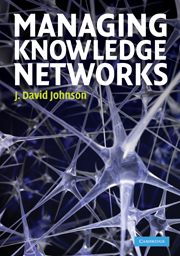Book contents
- Frontmatter
- Contents
- List of figures
- List of tables
- List of boxes
- Preface
- Acknowledgments
- 1 Introduction and overview
- Fundamentals
- Contexts
- Pragmatics
- 9 Creativity and innovation
- 10 Productivity: efficiency and effectiveness
- 11 The human side
- 12 Finding knowledge
- 13 Decision making
- 14 Summary and commentary
- References
- Index
- References
14 - Summary and commentary
Published online by Cambridge University Press: 05 June 2012
- Frontmatter
- Contents
- List of figures
- List of tables
- List of boxes
- Preface
- Acknowledgments
- 1 Introduction and overview
- Fundamentals
- Contexts
- Pragmatics
- 9 Creativity and innovation
- 10 Productivity: efficiency and effectiveness
- 11 The human side
- 12 Finding knowledge
- 13 Decision making
- 14 Summary and commentary
- References
- Index
- References
Summary
People underestimate the value of what they do not know, and overestimate the value of what they do know.
(Bates 2005, p. 5)Information has always been a source of power, but it is now increasingly a source of confusion. In every sphere of modern life, the chronic condition is a surfeit of information, poorly integrated or lost somewhere in the system.
(Wilensky 1968, p. 331)Simply proposing more or better communication is the oldest consulting recommendation in the book – and no one today really needs more meetings.
(Cross et al. 2004, p. 67)In this chapter I bring together my central themes and point to the future. A compelling feature of research on KN is that it stands at the intersection of so many important theoretical and policy issues such as the converging trends surrounding globalization and the “flattening” of our world; the increasing complexity and blurring boundaries represented in new organizational forms; difficult individual challenges selecting career paths and loyalty, or the lack thereof, on everyone's part, cited in Chapter 1. These trends lead to dilemmas, for both individuals and organizations, in the development and sharing of knowledge in KN.
I discussed the fundamental concepts, the building blocks of KN, in Chapters 2 and 3. In Chapter 2 I defined knowledge, distinguishing it from such common terms as information and wisdom. This chapter also discussed the various forms that knowledge can take within organizations, thus making critical distinctions that can be used in defining relationships.
- Type
- Chapter
- Information
- Managing Knowledge Networks , pp. 277 - 297Publisher: Cambridge University PressPrint publication year: 2009



